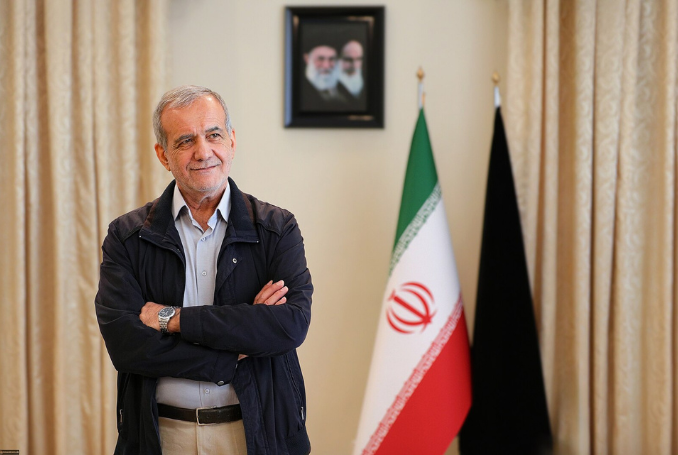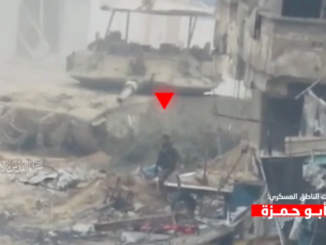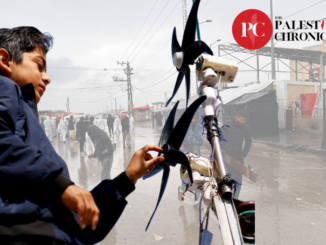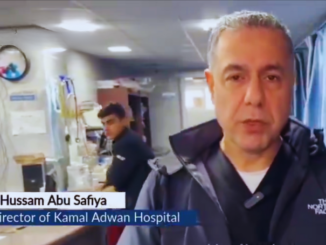
In a phone conversation, the leaders of Iran and Oman stressed the importance of exerting pressure on Western powers to end Israeli aggression on Gaza and Lebanon.
Iranian President Masoud Pezeshkian urged on Thursday for increased pressure to be exerted on Israel to push for an end to its wars on Gaza and Lebanon, describing the Israeli occupation army as a “killing machine.”
In a telephone conversation with Oman’s Sultan Haitham Bin Tariq Al-Said, Pezeshkian extended his gratitude for Muscat’s “firm stance on Israeli violations”, reiterating that his country places priority on its relation with Oman to enhance cooperation between neighboring countries, the Middle East Monitor reported.
“Strengthening friendly and amicable relations between regional countries and expanding regional cooperation guarantees a shared vision and language to solve our region’s problems,” Pezeshkian reportedly said.
According to the Iranian president, this cooperation between neighboring countries is pivotal for “collective development, promoting welfare, peace and comfort across the region”.
Iran is ‘Postured and Poised’ for an Attack on Israel – White House
During the phone conversation, Pezeshkian emphasized the importance of “greater unity” amongst Muslim nations.
“If Muslim countries act as one, the Zionist regime will not dare commit violations so easily, nor will the US and Western countries be able to support it,” the Iranian president was quoted as saying by MEMO.
On his part, Sultan Bin Tariq Al-Said voiced his admiration of Tehran’s stance and support on Gaza and Lebanon, while slamming the West’s double standards throughout Israel’s raging war on Gaza and Lebanon.
“Oman has always maintained that the continued support by Western countries for Israel’s crimes is neither acceptable nor justified in any way,” he reportedly said.
Moreover, the Sultan of Oman reiterated his country’s commitment to supporting “the rights of oppressed people in the region,” stressing that Muscat’s priority is to put an end to the Israeli aggression in Gaza and Lebanon.
Enforcing Regional Ties
Since the election of Masoud Pezeshkian as president, Tehran has been exerting efforts on the regional and international level to mobilize support for an end to Israel’s war on Gaza and later on Lebanon.
Pezeshkian met with his Russian counterpart Vladimir Putin on October 11 and discussed solidifying a front that would work towards peace and stability in the region and the world.
Two days earlier, Iranian Foreign Minister Abbas Araghchi met with his Saudi counterpart, Prince Faisal bin Farhan, to discuss bilateral relations and regional issues, including the situation in Gaza and Lebanon.
Aggression and Counterattack – How Important is Iran in the Palestinian Quest for Liberation?
The two “held useful and constructive talks on latest developments in the region & situation in Gaza and Lebanon,” the Iranian Foreign Ministry spokesperson, Esmaeil Baghaei, stated on X, along with a photo of the two officials, on October 9.
“They stressed that war on Gaza and Lebanon must stop and humanitarian assistance must be allowed to be provided to refugees and displaced persons immediately,” Baghaei said.
He added that the ministers “also reviewed the latest status of bilateral relations and reaffirmed their shared determination to continue improving relations in political, security and economic areas.”
Ahead of the trip, Baghaei said Iran was “determined to keep consolidating its relations with its neighbors in pursuit of sustainable security & stability as well as economic cooperation that would benefit all nations of the region.”
“Carnage and aggression must be stopped,” he stressed.
Gaza Genocide Continues
Flouting a UN Security Council resolution demanding an immediate ceasefire, Israel has faced international condemnation amid its continued brutal offensive on Gaza.
Currently on trial before the International Court of Justice for genocide against Palestinians, Israel has been waging a devastating war on Gaza since October 7.
According to Gaza’s Ministry of Health, 42,438 Palestinians have been killed, and 99,246 wounded in Israel’s ongoing genocide in Gaza starting on October 7, 2023.
Moreover, at least 11,000 people are unaccounted for, presumed dead under the rubble of their homes throughout the Strip.
Israel says that 1,200 soldiers and civilians were killed during the Al-Aqsa Flood Operation on October 7. Israeli media published reports suggesting that many Israelis were killed on that day by ‘friendly fire’.
Palestinian and international organizations say that the majority of those killed and wounded are women and children.
The Israeli war has resulted in an acute famine, mostly in northern Gaza, resulting in the death of many Palestinians, mostly children.
The Israeli aggression has also resulted in the forceful displacement of nearly two million people from all over the Gaza Strip, with the vast majority of the displaced forced into the densely crowded southern city of Rafah near the border with Egypt – in what has become Palestine’s largest mass exodus since the 1948 Nakba.
Later in the war, hundreds of thousands of Palestinians began moving from the south to central Gaza in a constant search for safety.
(PC, MEMO)










Be the first to comment